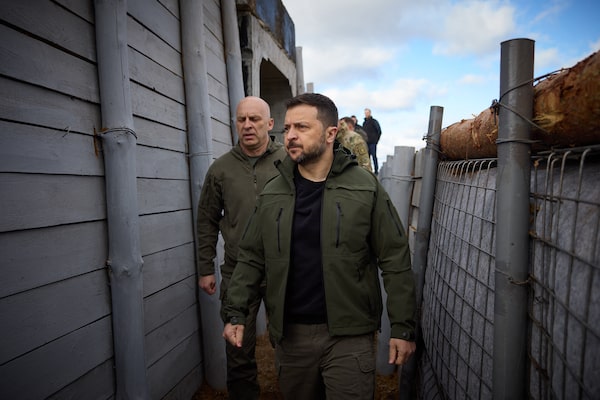
Ukraine's President Volodymyr Zelensky inspects the construction of fortifications at an undisclosed location in Donetsk region, amid the Russian invasion of Ukraine, on April 19.HANDOUT/Getty Images
Vladyslav Golovin is a Ukrainian journalist and former deputy editor-in-chief of Forbes Ukraine.
In a quaint resort town on the shores of the Adriatic Sea in Croatia, I stepped into a local souvenir shop to purchase a memento while on vacation with my children. Among the array of fridge magnets featuring landmarks, world leaders or colourful aphorisms, a familiar face caught my eye: Ukrainian President Volodymyr Zelensky, in tchotchke-magnet form. I knew he had become a symbol of our struggle in Ukraine, but it was the first time I realized he had also become part of global popular culture.
It’s all the more astonishing to grasp the vast disparity between his reputation outside Ukraine and within it. To foreigners, our President is one of the bravest in the world. He etched himself into history with just one phrase: “I need ammunition, not a ride.” Despite the clear danger of Kyiv being captured at the onset of Russia’s invasion in 2022, he remained at the helm of the resistance and has continued to exemplify remarkable courage. Almost every month he visits the front lines, boosting the morale of soldiers and bestowing honours upon the bravest. Sometimes, these ceremonies take place dangerously close to enemy positions.
At first, this display of courage not only inspired foreigners but also Ukrainians themselves. Mr. Zelensky’s approval rating surged sharply in the first year of the invasion, from 37 per cent just before the war, to 90 per cent in February, 2023, according to data from the Kyiv International Institute of Sociology (KIIS).
However, over time, there has been a drastic shift in his perception by the public. Mr. Zelensky’s popularity has steadily declined during the war, and as of February of this year, KIIS found it reached just 60 per cent. Among his supporters, those who “strongly” did so dropped from 42 per cent in September, 2023, to 22 per cent as of February, according to the International Republican Institute.
There are several reasons for this decline that may not be apparent from abroad, but are evident to Ukrainians.
The President embodies power, and any disillusionment with power among the people will be personified by his figure. We still haven’t driven the enemy from our land; we still suffer losses on the front lines among our military; civilian casualties from daily rocket attacks continue. This is not solely the President’s responsibility, and many other factors are at play. However, when those in power fail to provide the most essential thing for citizens – security – they tend to lose support.
The President’s courage at the onset of the war impressed everyone. He remained with his people and did not flee. However, the constant repetition of this narrative over the years has become wearisome. His presence saturates the country’s media spaces. Only he informs the population of the consequences of any rocket attack, even though officials at the local level or even rescue workers could do so. Only he provides media updates about what is happening on the front lines, though many generals and colonels would be just as capable of doing so. One of Mr. Zelensky’s newer, unofficial nicknames is “Bonewtik,” which roughly means “because he did not run away,” which is used more to mock him than praise him. Ukrainian soldiers grimly joke about the President’s excessive media presence, often quipping that in this war with Russia, their country has only two heroes – Mr. Zelensky and Patron, the Jack Russell terrier mascot for the State Emergency Service of Ukraine.
A notable decline in Mr. Zelensky’s popularity came after he decided to dismiss General Valerii Zaluzhnyi, the commander-in-chief of the Ukrainian army, earlier this year. For many Ukrainians, it was Gen. Zaluzhnyi, popular among soldiers and officers, who became a symbol of the struggle. Mr. Zelensky, after all, is a civilian, not a military man, and this fight has been carried out by the army.
But Gen. Zaluzhnyi had also been at odds with Mr. Zelensky before his dismissal, leaving the President with a difficult choice. He suffered the consequences in the aftermath – prior to Gen. Zaluzhnyi’s dismissal, Mr. Zelensky’s overall approval stood at 65 per cent, according to KIIS data. Immediately after, it dropped five percentage points.
This decline in the President’s popularity does not pose any real threat to Mr. Zelensky’s ability to maintain power. According to Ukrainian laws, elections are not held during wartime. But even if changes were made to the law, 67 per cent of Ukrainians do not support holding elections during wartime, says a survey by the International Republican Institute.
Yes, Ukrainians have become disillusioned with Mr. Zelensky. But as long as the enemy is on our land and as long as we continue the fight, no one will be looking for a new president. There are far more important tasks at hand: for example, removing from our lands the soldiers of the President of a neighbouring country – another Vladimir.